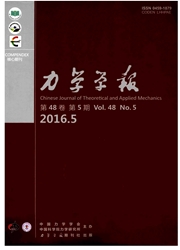

 中文摘要:
中文摘要:
惯量是影响机器人动态性能的主要因素,并联机器人因其多支链耦合的结构特点,关节空间各驱动轴出现惯量耦合的动力学特性,在高速、高加速度运动时易引起控制超调、振动等现象,破坏机器人的动态性能,因此研究并联机器人惯量耦合特性具有重要意义。以3-PRS并联机器人为例,通过虚功原理求得惯量矩阵,提出惯量耦合指标,该耦合指标表征了并联机器人在工作空间不同位姿时各驱动轴的耦合惯量大小,并给出了该耦合指标在机器人工作空间内的分布规律。进一步在一台3-PRS并联机器人样机上进行了实验验证,结果表明耦合惯量会改变驱动轴负载,负载的改变将最终影响动态性能。同时各驱动轴的负载变化量随着惯量耦合指标的变大而变大,与理论分析有较好的一致性。研究成果可帮助评价并联机器人的动力学耦合特性,并可用于并联机器人的结构参数优化及伺服参数调试以提高机器人的动态性能。
 英文摘要:
英文摘要:
Inertia is the main factor which affects the dynamic performance of a robot, due to the multi-close-loop structure of parallel robots, and the inertia of each driving shaft in joint space exists coupling property which will result in negative phenomena such as control overshoot and vibration especially when parallel robots work with high velocity and high acceleration. Thus, it is significant to study and evaluate the inertia coupling property of parallel robots. In this paper, based on the 3-PRS parallel robot, the inertia matrix is obtained through the principle of virtual work and an inertia coupling index is proposed, the coupling index represents the size of coupling inertia of each driving shaft when the robot works at different poses in the workspace. Then the distribution law of the index in workspace is analysed. Finally, a validation experiment is carried out on a typical 3-PRS parallel robot, the experimental results show that the load of each driving shaft will be changed by the coupling inertia, then the dynamic performance of the robot will be affected by the variation of load. Meanwhile, the variation of load increases when the inertia coupling index becomes larger. The experimental results agree well with the theoretical analysis. This research result can be used to evaluate the dynamic coupling property of parallel robots, and it can also be used to optimize the structural parameters and design control parameters to further improve the dynamic performance of parallel robots.
 同期刊论文项目
同期刊论文项目
 同项目期刊论文
同项目期刊论文
 期刊信息
期刊信息
